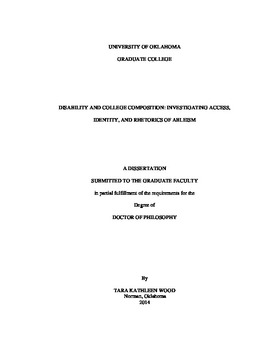| dc.contributor.advisor | Carter, Christopher | |
| dc.contributor.author | Wood, Tara | |
| dc.date.accessioned | 2014-05-19T16:10:48Z | |
| dc.date.available | 2014-05-19T16:10:48Z | |
| dc.date.issued | 2014-05-09 | |
| dc.identifier.uri | https://hdl.handle.net/11244/10434 | |
| dc.description.abstract | This dissertation analyzes the accessibility and accommodation experiences of students with disabilities in college writing classrooms at a Midwestern public research university. The study argues that writing teachers need to work more deliberately to increase access and that this can be achieved by listening to students’ suggestions for enabling accessible pedagogies. Increasing access requires that disability awareness be integral to the design of a course, not simply adding accommodations as a retrofit for individual students. Drawing on the perspectives of students with disabilities, access-centered pedagogy is presented as an alternative to accommodation models. Access-centered pedagogy is an approach to teaching that considers access a central value and aims for sustained and reflective attention to ensuring its realization for all students. Finally, the dissertation investigates the rhetorics of ableism to which students with disabilities are subject and makes an argument for combating such discrimination, through pedagogy, administration, and increased attention to disability as both subject position and critical modality. | en_US |
| dc.language | en_US | en_US |
| dc.subject | Language, Rhetoric and Composition. | en_US |
| dc.title | Disability and College Composition: Investigating Access, Identity, and Rhetorics of Ableism | en_US |
| dc.contributor.committeeMember | Kates, Susan | |
| dc.date.manuscript | 2014-05-09 | |
| dc.thesis.degree | Ph.D. | en_US |
| ou.group | College of Arts and Sciences::Department of English | |
